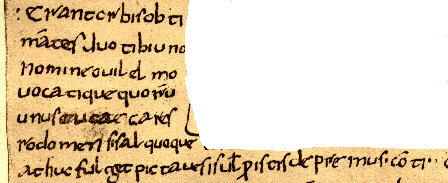MSS.
Florence Libri 15

Erant orbis obti
mantes duo tibi uno
nomine o uilelmo
uocatique quorum
unus tucae cares
rodomensis al quoque
at huc fulget pictauesis uel pro istis depremus.
Conti.
Clermont-Ferrand —
EDITIONS
Lair
Erant orbis obtimates duo mihi
Uno nomine, o Willelme, vocati.
Quorum unus vocaretur (?) rodomensis;
Al[ter] quoque adhuc fulget Pictavensis;
Vel pro istis deprecemus.
Cuncti flete...
Meyer
Erant orbis obtimates duo ibi
Quorum unus est necatus rodomensis;
Al[ter] quoque adhuc fulget Pictavensis;
Vel pro istis deprecemus.
Cuncti flete...
Lauer
Erant orbis obtimates duo tibi
uno nomine, o Vilelme, vocati
quorum unus, tu, vocares rodomensis
al[ter] quoque ethuc fulget pictave[n]sis
vel pro istis depre[ce]mus.
Cuncti flete...
Becker
Erant orbis optimates duo tibi,
o Willelme, uno nomine vocati,
quorum unus praesul erat Senonensis,
alter comes adhuc viget Pictavensis.
vel pro istis deprecemur.
Cuncti flete pro Willelmo innocente interfecto.
TRANSLATIONS
Becker
Es waren zwei Großen der Welt, eines Namens mit
Dir, o Wilhelm, deren einer der Erzbischof von Sens
war und der andere noch heute als Graf von Poitou
lebt. Auch für diese wollen wir Fürbitte
einlegen.
Van Houts
There were two great men on earth,
who like you [?] bore the name of William
of whom one [was] count [?] of Rouen
and the other still lives in Poitou
let us pray for them.
Shed tears for William
who died innocently
Helmerichs
There were two noblemen of the world
O William, called by the same name,
You were one of them, called “of Rouen”;
and the other still shines at Poitou.
Let us pray for them.
All weep for innocent, slain William.
COMMENTARIES
Lair
J’ai expliqué ci-dessus, les interprétations
possibles du texte du manuscrit pour le premier
vers. On peut aussi lire et éditer: Quorum
unus tu vocaris Rodomensis. Ne pas trop
se préoccuper du temps des verbes, voir erant
appliqué au Guillaume mort et au Guillaume vivant. (Étude
sur Guillaume, p. 69.)
Becker
F tibi uno nomine o Uilelmo vocatique; der
Versrhythmus gebietet die Umstellung. F quorum
unus tucae cares rodomensis gibt keinen Sinn.
Es ist klar, daß zwei andere Wilhelme gemeint sind,
zur Wahl für den ersten bot sich nur der Erzbischof
Wilhelm von Sens. (“Der Planctus,” p. 197.)